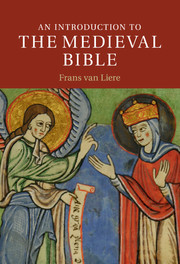Book contents
- Frontmatter
- Dedication
- Contents
- Preface
- Chapter 1 Introduction
- Chapter 2 The Bible as Book
- Chapter 3 The Medieval Canon
- Chapter 4 The Text of the Medieval Bible
- Chapter 5 Medieval Hermeneutics
- Chapter 6 The Commentary Tradition
- Chapter 7 The Vernacular Bible
- Chapter 8 The Bible in Worship and Preaching
- Chapter 9 The Bible of the Poor?
- Afterword
- Appendix A A Comparative Canon Chart
- Appendix B Names for Biblical Books
- Appendix C A Schematic Genealogy of Old Testament Translations
- Bibliography
- Index of Manuscripts Cited
- Index of Biblical References
- Subject and Author Index
- References
Chapter 6 - The Commentary Tradition
Published online by Cambridge University Press: 05 June 2014
- Frontmatter
- Dedication
- Contents
- Preface
- Chapter 1 Introduction
- Chapter 2 The Bible as Book
- Chapter 3 The Medieval Canon
- Chapter 4 The Text of the Medieval Bible
- Chapter 5 Medieval Hermeneutics
- Chapter 6 The Commentary Tradition
- Chapter 7 The Vernacular Bible
- Chapter 8 The Bible in Worship and Preaching
- Chapter 9 The Bible of the Poor?
- Afterword
- Appendix A A Comparative Canon Chart
- Appendix B Names for Biblical Books
- Appendix C A Schematic Genealogy of Old Testament Translations
- Bibliography
- Index of Manuscripts Cited
- Index of Biblical References
- Subject and Author Index
- References
Summary
Christian communities throughout the Middle Ages used the Bible as a tool for the education and edification of both the clergy and the laity. No other book in the Middle Ages invited commentary as the Bible did, and the sheer bulk of the material that has been preserved is impressive. Commentaries alone do not do justice to the wide range of scholarly writing that the Bible inspired. Lexicons, chronologies, concordances, versifications, and abridgments all attest to the primacy of the Bible as the medieval study book. Not all of this material is available today in print; much of it exists in manuscript only. Most of it is also forgotten or ignored by modern biblical interpreters, which is unfortunate. In modern Jewish circles, it is not uncommon to consult Rashi, a medieval interpreter, on matters of scriptural interpretation; by contrast, no equivalent for Rashi exists in the Christian tradition. The inaccessibility of the texts is partly to blame for this; of the medieval commentaries that are available in print, relatively few have been translated into modern languages. Another reason is that, as we have seen in the previous chapters, modern hermeneutical assumptions have shifted away from the questions that medieval commentaries asked of the text. Their reasoning seems hard to follow and often appears repetitive and unoriginal. The influence of patristic commentary on the medieval tradition is immense, to the extent that some scholars have dismissed the medieval exegetical tradition as purely derivative. As we will see later, however, this assessment does not do justice to the medieval commentary tradition. Although not everyone may agree that these medieval commentaries are relevant for modern theologians and preachers, read in their proper context, they can nevertheless give fascinating insights into a variety of aspects of medieval life, not just theology and biblical interpretation. The tradition of biblical interpretation touches on topics as diverse as science, education, psychology, and politics.
- Type
- Chapter
- Information
- An Introduction to the Medieval Bible , pp. 141 - 176Publisher: Cambridge University PressPrint publication year: 2014

